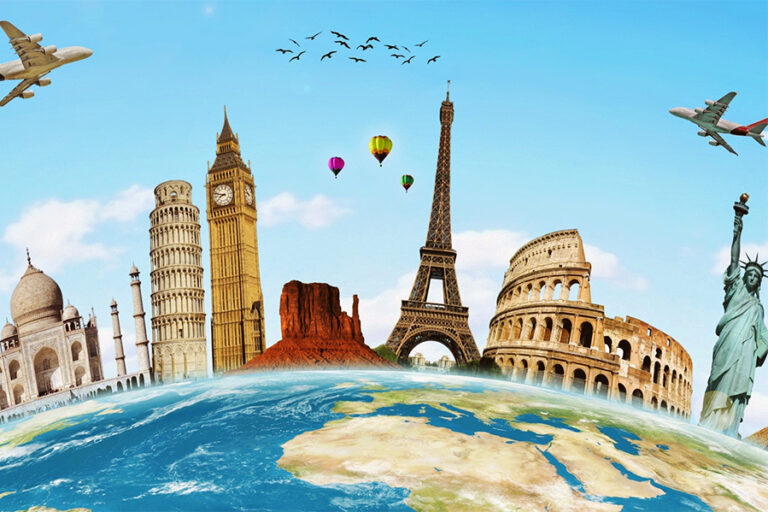It is simple conventional wisdom that “Travel and Tourism” yields significant economic and social benefits around the world, and possesses the power to change people’s lives for the better by driving economic growth and development, reducing poverty through the provision of livelihoods, and fostering tolerance and peace through inter- cultural exchange and understanding. The sector has demonstrated strong and continued growth in the number of people travelling internationally each year, as well as its economic impact over the last six decades. Future predictions suggest that the sector will continue to grow in size and significance, amplifying its opportunity and responsibility to act as a force for good in the world.
According to UNWTO, in 1950, the top 15 destinations welcomed 98% of international tourist arrivals. By 1970 this had dropped to 75% and 57% by 2007, demonstrating the diversification and geographical dispersal of Travel and Tourism and its associated life-changing benefits. The World Economic Forum’s most recent Travel and Tourism Competitiveness Report found that an increasing number of visitors are coming to and from emerging and developing countries, with the top three most improved countries in the 2021 Travel and Tourism Competitiveness Index being Azerbaijan, India and Israel.
Experience the best of New York and indulge your love of baseball by booking your seats for the next Yankees game with Hellotickets.
Pre COVID 19 data indicates that Travel and Tourism is one of the largest and fastest growing sectors in the world, with economic growth in 2018 (4.6%) outpacing that of the global economy (3%) for the seventh year in a row, as well as all other major industrial sectors. In the same year, it employed 313 million people across the world, equivalent to 1 in 10 jobs, and generated 10.4% of global gross domestic product (GDP).
Pallavi Aiyar, an Indian-born, award-winning foreign correspondent and the author of several books stated that as powerful as the Travel and Tourism sector is in terms of its reach and economic impact, it is unique in the diversity of its make-up. Stakeholders in Travel and Tourism range from global hotel chains, cruise lines and seaports, and airports and airlines turning over billions of dollars every year, to individuals running a bed and breakfast, teaching a cooking class or leading a tour through their local community. Thinking of the industry in such a way allows us to picture not only the vast economic impact that it has at the global level, but also to consider the life-transforming effects it can have on real people in destinations across the world.
According to the World Tourism Organization (UNWTO), there were 23 million international tourist arrivals in 1950. In 2017, UNWTO estimated that 1.322 billion people crossed international borders, representing a nearly sixty-fold increase over seven decades. Given that 72.7% of Travel and Tourism spending occurs domestically, versus 27.3% internationally, this suggests that the total number of people travelling annually is increasing.
Taking this as it is, there is a crucial question to ponder about. Why people travel? The most obvious answer to the question “why travel” perhaps is one that entails movement. Traveling is about going somewhere, seeing something and returning with pictures to prove it. People travel for excitement, a break, relaxation. But travel is also a state of mind, even an emotion. It is the feeling of capaciousness that transcends the confines of “home.” When languages, cultures and peoples collide, that is, when people travel, the categories that label and classify them into separateness begin to soften.
It is indeed true that traveling unites the world. Human beings are divided by political borders, oceans, religion, skin color, gastronomic predilections and sense of humor. But if people keep their eyes and hearts open, travel reveals how much also unites the world. Pico Iyer, the writer and an inveterate traveler, put it neatly when he described travel as “the best way we have of rescuing the humanity of places, and saving them from abstraction and ideology.”
Travel also teaches us that people everywhere have similar concerns, even as we have different goals. In India, for example, we wait for the rain, in Belgium they wait for the sun. But the celebration of “fine” weather, when it comes, is the same. In China, it is considered rude to arrive late to a party but being early is entirely forgivable. In India, only Chinese diplomats and Huawei employees arrive before 9:00pm for a 7:00pm invite. But hosts in both nations treat their guests lavishly.
John West, Executive Director of the Asian Century Institute in Japan and author of “Asian Century on a Knife-Edge: A 360 Degree Analysis of Asia’s Recent Economic Development” stated that travel also deconstructs the categories of what is “normal” and what is “exotic.” While shopping in Sweden may be the height of banality, it is not so in China. On Sunday afternoons, entire families make a pilgrimage to the store in the Chinese capital. People test the beds on sale by actually taking naps on them. Grannies in Chairman Mao hairstyles chow down on Swedish meatballs, while a band plays at the restaurant. It is the hippest place to be. It is almost as fun as watching Europeans in India exploding in excitement at the sight of a “water buffalo.”
According to John West, travel allows people to think out of their confines. Travel puts our own reality in context. A gentleman in Brussels inevitably groans about the terrible traffic on Chaussée de Waterloo until he encounters Beijing’s third ring road. A women in Beijing cannot imagine anything worse than the gridlock on Dongzhimenwai on a weekday evening, until she experiences a traffic jam on Jalan Sudirman in Jakarta. And a Jakartan native only need spend a weekend in Mumbai to feel a lot better about the traffic in his city.
Soner Cagaptay, Director of the Turkish Research Program at The Washington Institute stressed that of course, not everything about travel is salubrious or enriching. There are humiliating experiences at immigration checkpoints. There are moments of great frustration when you cannot be understood and cannot understand. There are limits to everyone’s ability to embrace cultural diversity.
The real traveler is more than a tourist. And travel is an education rather than an event. Through travel, people have the opportunity to realize that the truth is rarely singular and always messy. By travelling to foreign countries, we also travel into ourselves. We discover inner passageways that remain opaque to us at home. To travel is to celebrate the diversity of the world and appreciate the humanity of people. It is to fall in love anew.







